Everland Wish: Financial, HR, and Legal Aspects of Hospitality
VerifiedAdded on 2023/01/13
|16
|3769
|54
Report
AI Summary
This report provides a detailed analysis of the hospitality business, focusing on the hypothetical restaurant, Everland Wish, situated in the UK. The report is divided into four key tasks. Task 1 delves into the financial transactions, including expenditures, incomings, and outgoings, along with principles of managing and monitoring financial performance such as financial statements, debtors trial balance, inventory records, and cash flow statements. Task 2 examines the HR lifecycle, encompassing attraction, recruitment, onboarding, enablement, development, and separation, with a focus on talent acquisition and retention within the food and beverage sector, including a performance development plan. Task 3 explores the legal regulations and rules that hospitality organizations must adhere to, such as the Minimum Wages Act, Equality Act, and Health and Safety Work Act. The report emphasizes the importance of financial management, HR practices, and legal compliance for the success of a hospitality business.
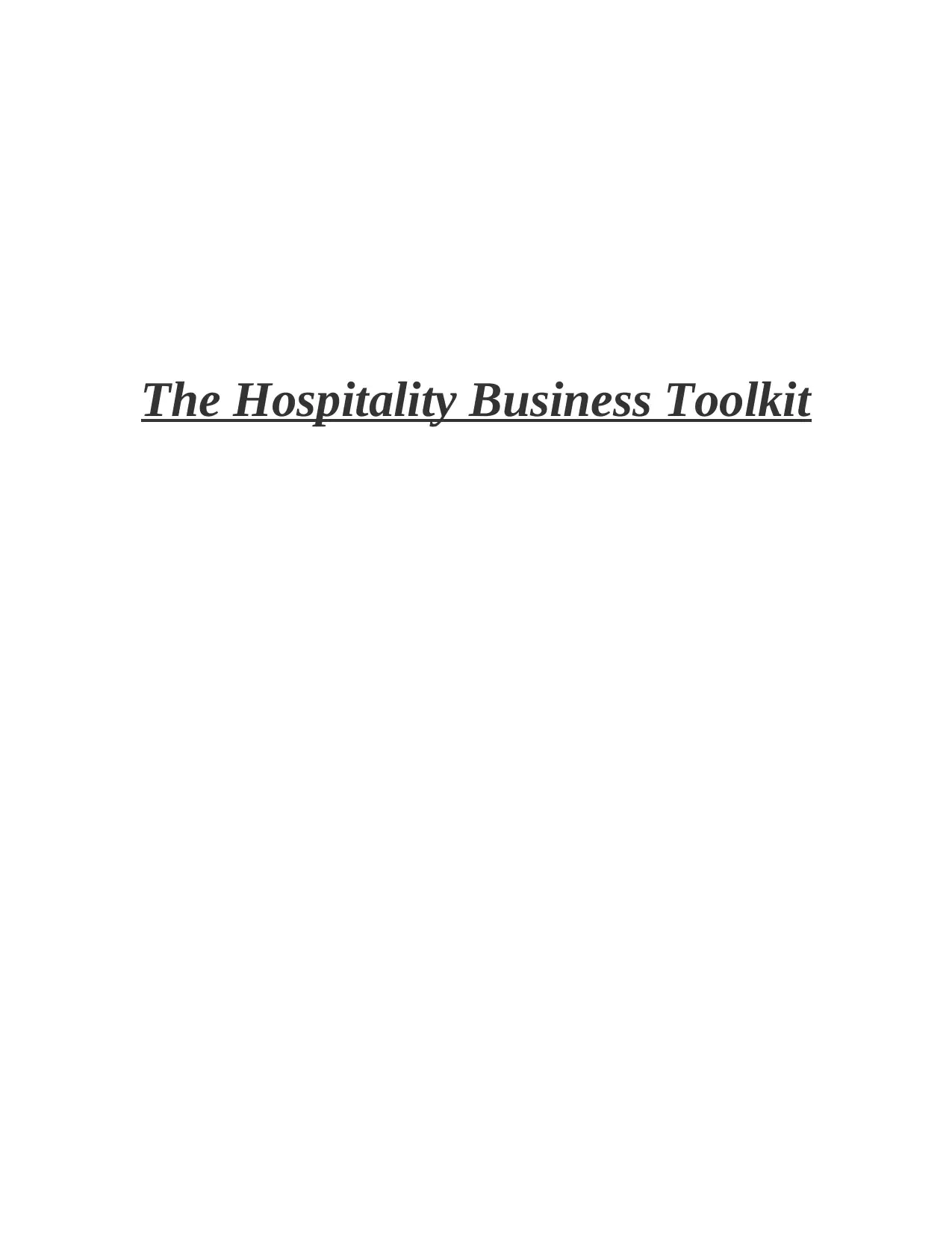
The Hospitality Business Toolkit
Paraphrase This Document
Need a fresh take? Get an instant paraphrase of this document with our AI Paraphraser
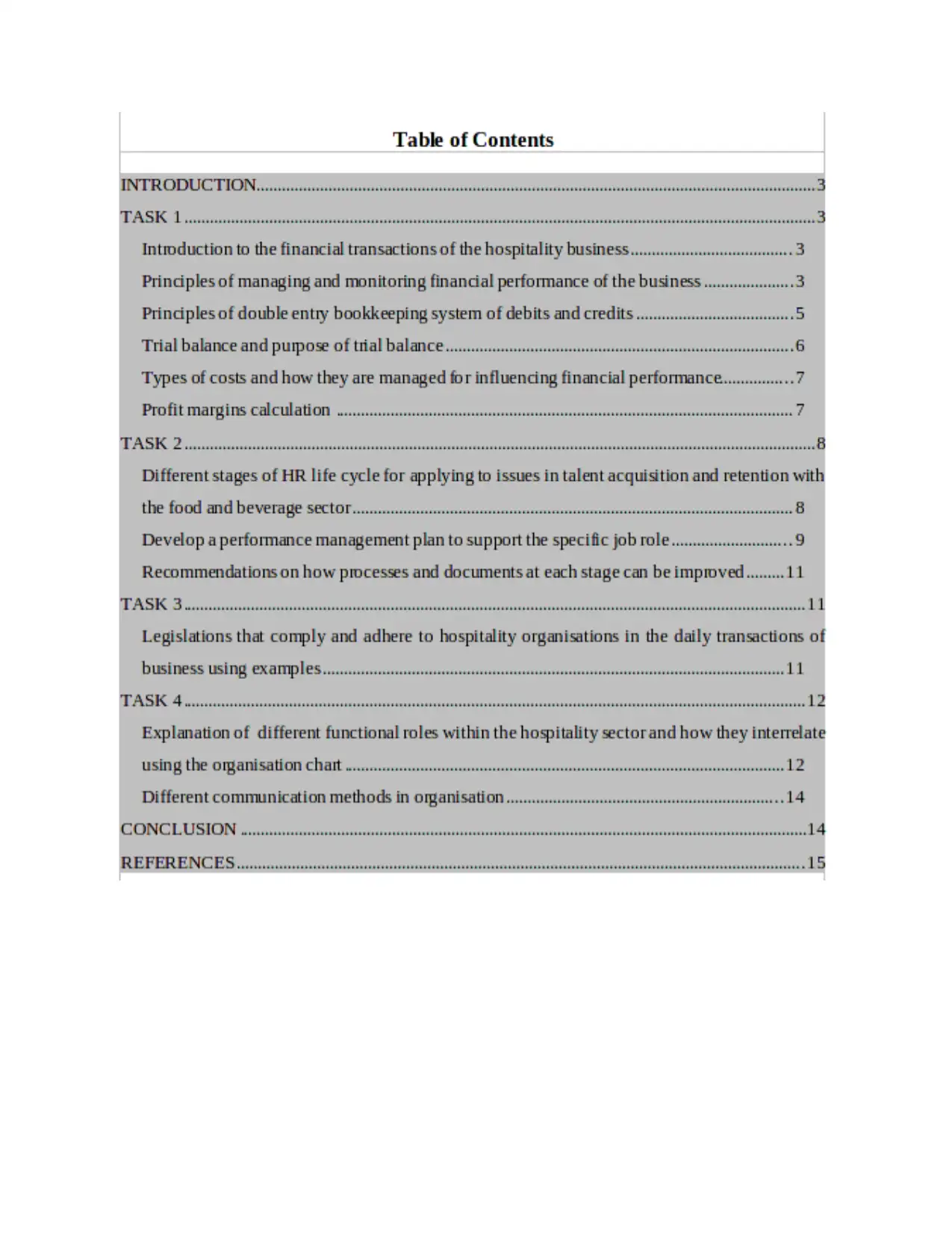
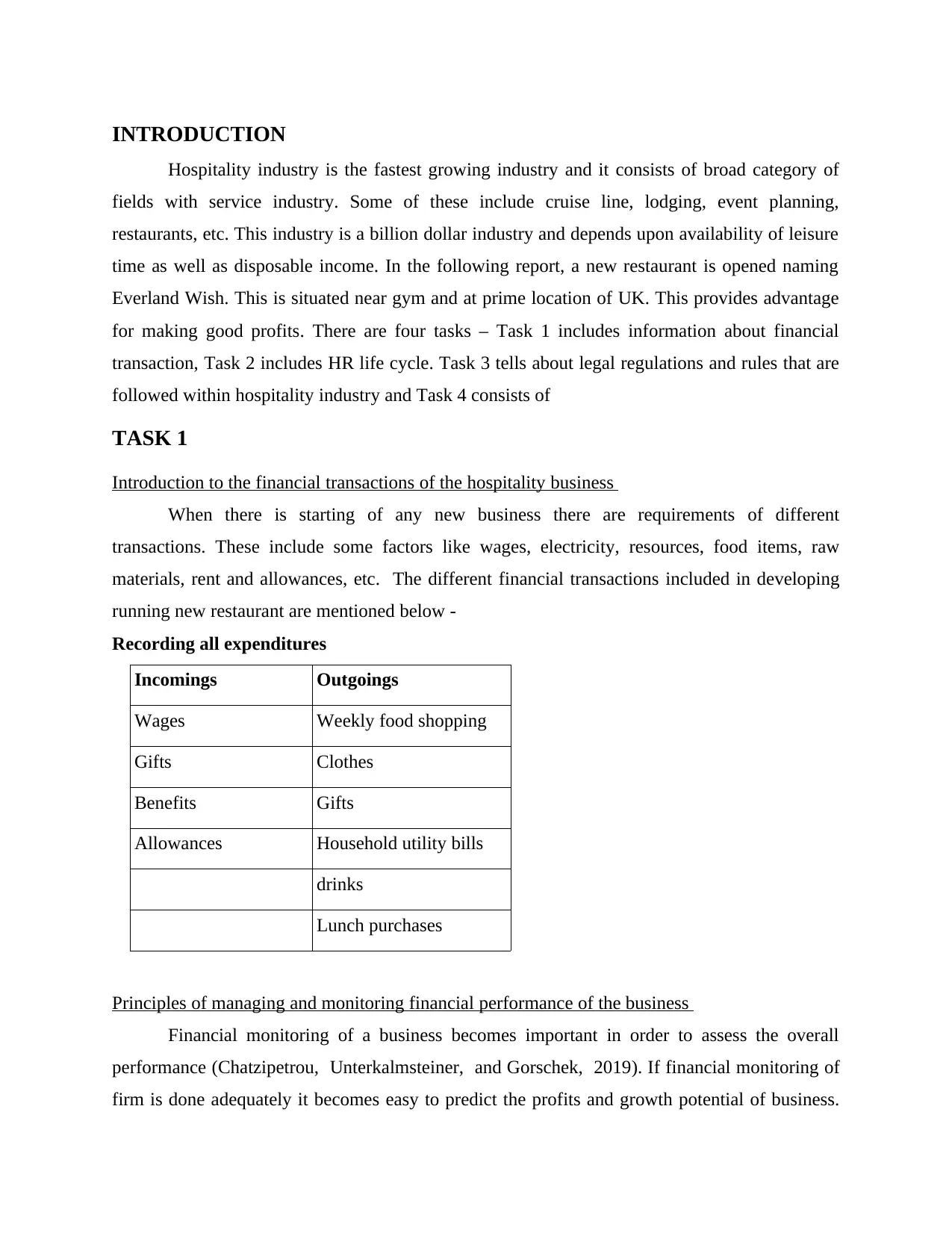
INTRODUCTION
Hospitality industry is the fastest growing industry and it consists of broad category of
fields with service industry. Some of these include cruise line, lodging, event planning,
restaurants, etc. This industry is a billion dollar industry and depends upon availability of leisure
time as well as disposable income. In the following report, a new restaurant is opened naming
Everland Wish. This is situated near gym and at prime location of UK. This provides advantage
for making good profits. There are four tasks – Task 1 includes information about financial
transaction, Task 2 includes HR life cycle. Task 3 tells about legal regulations and rules that are
followed within hospitality industry and Task 4 consists of
TASK 1
Introduction to the financial transactions of the hospitality business
When there is starting of any new business there are requirements of different
transactions. These include some factors like wages, electricity, resources, food items, raw
materials, rent and allowances, etc. The different financial transactions included in developing
running new restaurant are mentioned below -
Recording all expenditures
Incomings Outgoings
Wages Weekly food shopping
Gifts Clothes
Benefits Gifts
Allowances Household utility bills
drinks
Lunch purchases
Principles of managing and monitoring financial performance of the business
Financial monitoring of a business becomes important in order to assess the overall
performance (Chatzipetrou, Unterkalmsteiner, and Gorschek, 2019). If financial monitoring of
firm is done adequately it becomes easy to predict the profits and growth potential of business.
Hospitality industry is the fastest growing industry and it consists of broad category of
fields with service industry. Some of these include cruise line, lodging, event planning,
restaurants, etc. This industry is a billion dollar industry and depends upon availability of leisure
time as well as disposable income. In the following report, a new restaurant is opened naming
Everland Wish. This is situated near gym and at prime location of UK. This provides advantage
for making good profits. There are four tasks – Task 1 includes information about financial
transaction, Task 2 includes HR life cycle. Task 3 tells about legal regulations and rules that are
followed within hospitality industry and Task 4 consists of
TASK 1
Introduction to the financial transactions of the hospitality business
When there is starting of any new business there are requirements of different
transactions. These include some factors like wages, electricity, resources, food items, raw
materials, rent and allowances, etc. The different financial transactions included in developing
running new restaurant are mentioned below -
Recording all expenditures
Incomings Outgoings
Wages Weekly food shopping
Gifts Clothes
Benefits Gifts
Allowances Household utility bills
drinks
Lunch purchases
Principles of managing and monitoring financial performance of the business
Financial monitoring of a business becomes important in order to assess the overall
performance (Chatzipetrou, Unterkalmsteiner, and Gorschek, 2019). If financial monitoring of
firm is done adequately it becomes easy to predict the profits and growth potential of business.
⊘ This is a preview!⊘
Do you want full access?
Subscribe today to unlock all pages.

Trusted by 1+ million students worldwide
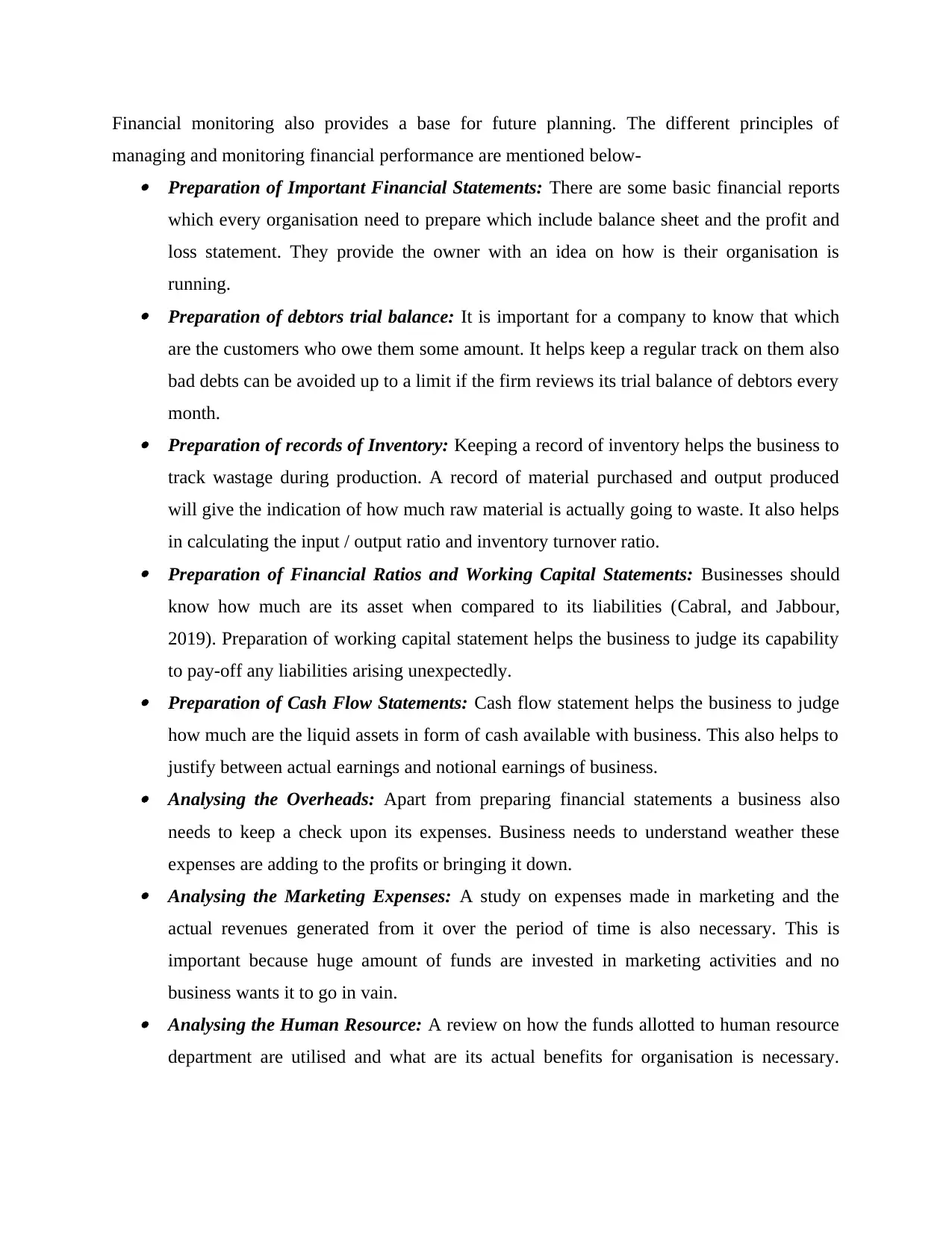
Financial monitoring also provides a base for future planning. The different principles of
managing and monitoring financial performance are mentioned below- Preparation of Important Financial Statements: There are some basic financial reports
which every organisation need to prepare which include balance sheet and the profit and
loss statement. They provide the owner with an idea on how is their organisation is
running. Preparation of debtors trial balance: It is important for a company to know that which
are the customers who owe them some amount. It helps keep a regular track on them also
bad debts can be avoided up to a limit if the firm reviews its trial balance of debtors every
month. Preparation of records of Inventory: Keeping a record of inventory helps the business to
track wastage during production. A record of material purchased and output produced
will give the indication of how much raw material is actually going to waste. It also helps
in calculating the input / output ratio and inventory turnover ratio. Preparation of Financial Ratios and Working Capital Statements: Businesses should
know how much are its asset when compared to its liabilities (Cabral, and Jabbour,
2019). Preparation of working capital statement helps the business to judge its capability
to pay-off any liabilities arising unexpectedly. Preparation of Cash Flow Statements: Cash flow statement helps the business to judge
how much are the liquid assets in form of cash available with business. This also helps to
justify between actual earnings and notional earnings of business. Analysing the Overheads: Apart from preparing financial statements a business also
needs to keep a check upon its expenses. Business needs to understand weather these
expenses are adding to the profits or bringing it down. Analysing the Marketing Expenses: A study on expenses made in marketing and the
actual revenues generated from it over the period of time is also necessary. This is
important because huge amount of funds are invested in marketing activities and no
business wants it to go in vain. Analysing the Human Resource: A review on how the funds allotted to human resource
department are utilised and what are its actual benefits for organisation is necessary.
managing and monitoring financial performance are mentioned below- Preparation of Important Financial Statements: There are some basic financial reports
which every organisation need to prepare which include balance sheet and the profit and
loss statement. They provide the owner with an idea on how is their organisation is
running. Preparation of debtors trial balance: It is important for a company to know that which
are the customers who owe them some amount. It helps keep a regular track on them also
bad debts can be avoided up to a limit if the firm reviews its trial balance of debtors every
month. Preparation of records of Inventory: Keeping a record of inventory helps the business to
track wastage during production. A record of material purchased and output produced
will give the indication of how much raw material is actually going to waste. It also helps
in calculating the input / output ratio and inventory turnover ratio. Preparation of Financial Ratios and Working Capital Statements: Businesses should
know how much are its asset when compared to its liabilities (Cabral, and Jabbour,
2019). Preparation of working capital statement helps the business to judge its capability
to pay-off any liabilities arising unexpectedly. Preparation of Cash Flow Statements: Cash flow statement helps the business to judge
how much are the liquid assets in form of cash available with business. This also helps to
justify between actual earnings and notional earnings of business. Analysing the Overheads: Apart from preparing financial statements a business also
needs to keep a check upon its expenses. Business needs to understand weather these
expenses are adding to the profits or bringing it down. Analysing the Marketing Expenses: A study on expenses made in marketing and the
actual revenues generated from it over the period of time is also necessary. This is
important because huge amount of funds are invested in marketing activities and no
business wants it to go in vain. Analysing the Human Resource: A review on how the funds allotted to human resource
department are utilised and what are its actual benefits for organisation is necessary.
Paraphrase This Document
Need a fresh take? Get an instant paraphrase of this document with our AI Paraphraser
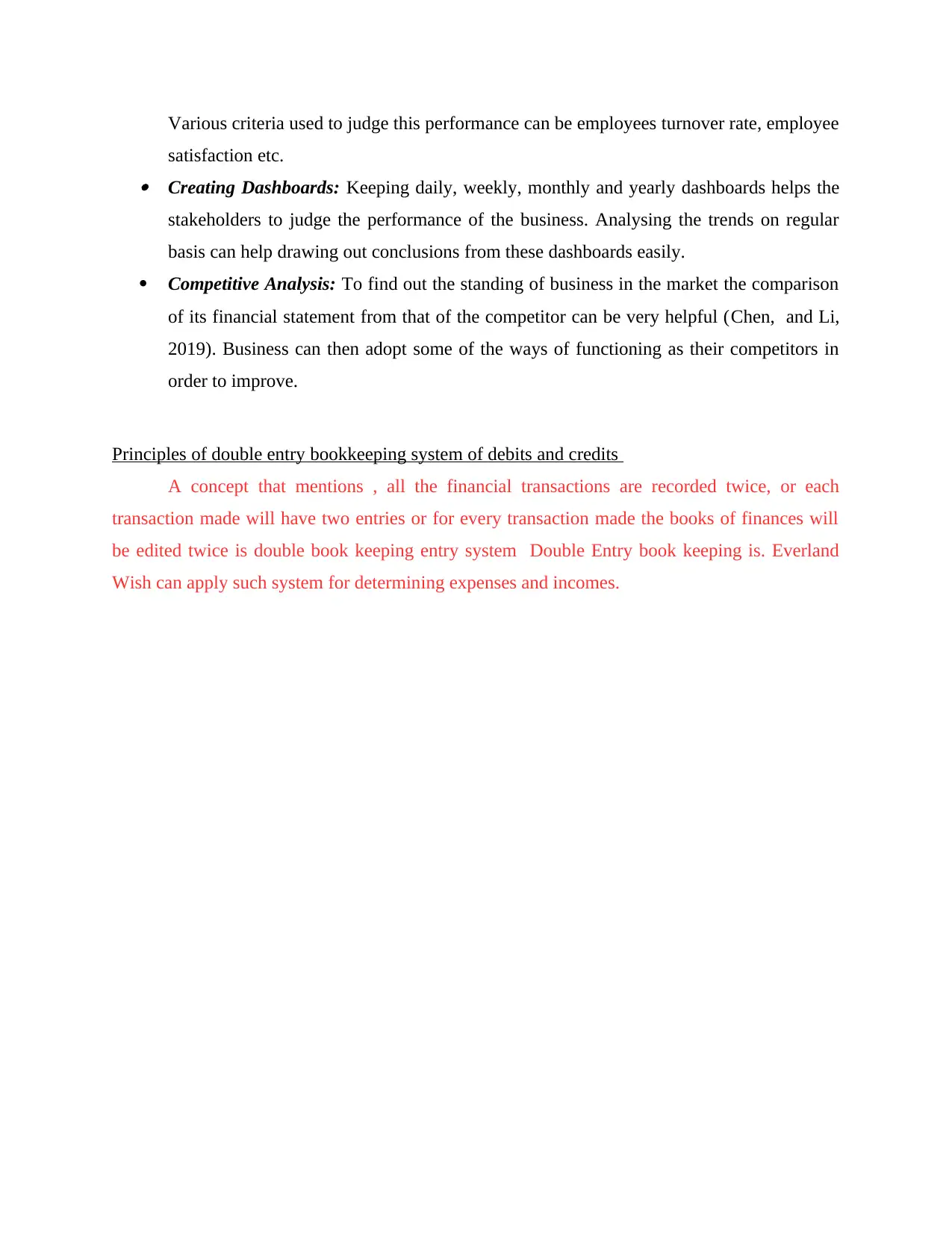
Various criteria used to judge this performance can be employees turnover rate, employee
satisfaction etc. Creating Dashboards: Keeping daily, weekly, monthly and yearly dashboards helps the
stakeholders to judge the performance of the business. Analysing the trends on regular
basis can help drawing out conclusions from these dashboards easily.
Competitive Analysis: To find out the standing of business in the market the comparison
of its financial statement from that of the competitor can be very helpful (Chen, and Li,
2019). Business can then adopt some of the ways of functioning as their competitors in
order to improve.
Principles of double entry bookkeeping system of debits and credits
A concept that mentions , all the financial transactions are recorded twice, or each
transaction made will have two entries or for every transaction made the books of finances will
be edited twice is double book keeping entry system Double Entry book keeping is. Everland
Wish can apply such system for determining expenses and incomes.
satisfaction etc. Creating Dashboards: Keeping daily, weekly, monthly and yearly dashboards helps the
stakeholders to judge the performance of the business. Analysing the trends on regular
basis can help drawing out conclusions from these dashboards easily.
Competitive Analysis: To find out the standing of business in the market the comparison
of its financial statement from that of the competitor can be very helpful (Chen, and Li,
2019). Business can then adopt some of the ways of functioning as their competitors in
order to improve.
Principles of double entry bookkeeping system of debits and credits
A concept that mentions , all the financial transactions are recorded twice, or each
transaction made will have two entries or for every transaction made the books of finances will
be edited twice is double book keeping entry system Double Entry book keeping is. Everland
Wish can apply such system for determining expenses and incomes.
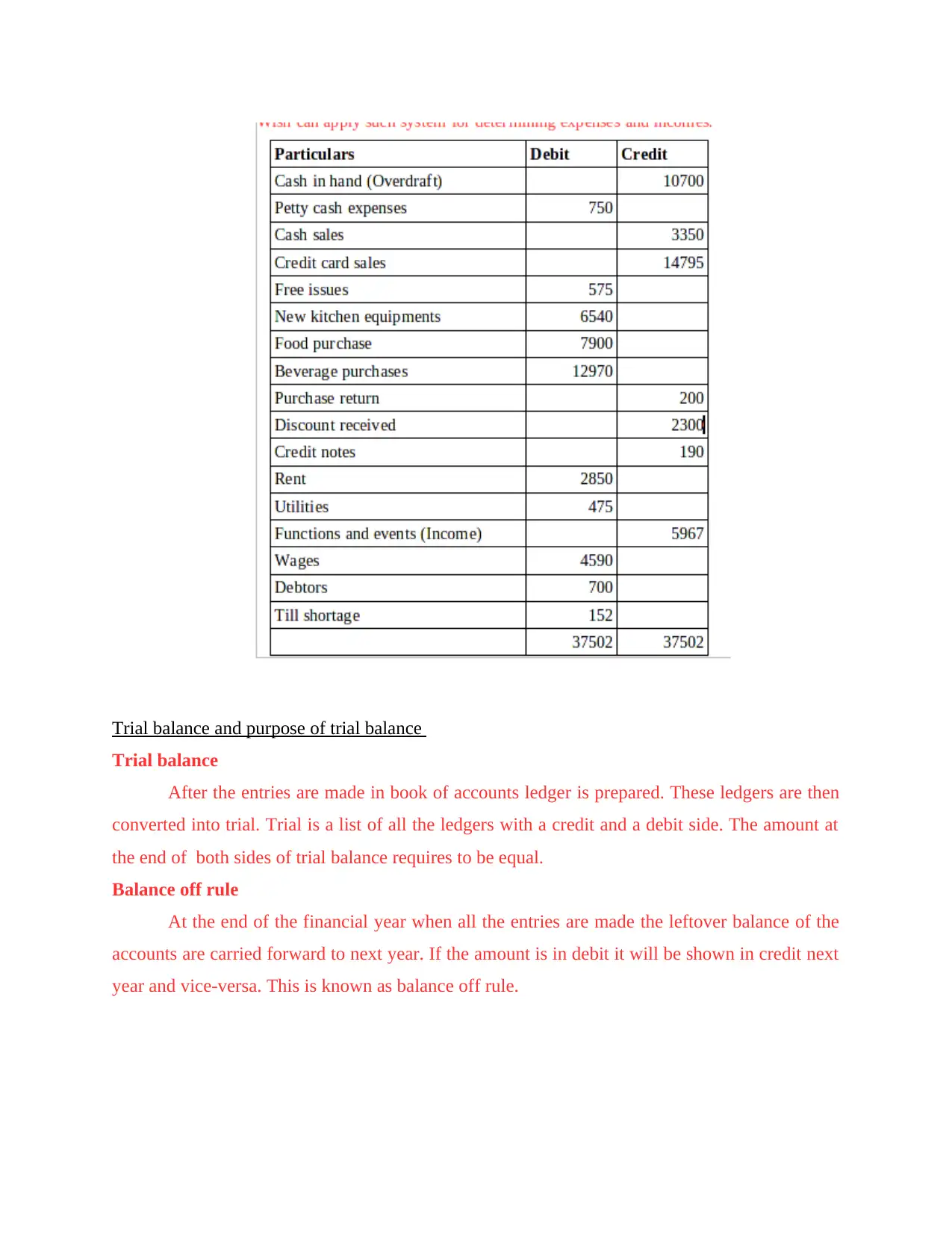
Trial balance and purpose of trial balance
Trial balance
After the entries are made in book of accounts ledger is prepared. These ledgers are then
converted into trial. Trial is a list of all the ledgers with a credit and a debit side. The amount at
the end of both sides of trial balance requires to be equal.
Balance off rule
At the end of the financial year when all the entries are made the leftover balance of the
accounts are carried forward to next year. If the amount is in debit it will be shown in credit next
year and vice-versa. This is known as balance off rule.
Trial balance
After the entries are made in book of accounts ledger is prepared. These ledgers are then
converted into trial. Trial is a list of all the ledgers with a credit and a debit side. The amount at
the end of both sides of trial balance requires to be equal.
Balance off rule
At the end of the financial year when all the entries are made the leftover balance of the
accounts are carried forward to next year. If the amount is in debit it will be shown in credit next
year and vice-versa. This is known as balance off rule.
⊘ This is a preview!⊘
Do you want full access?
Subscribe today to unlock all pages.

Trusted by 1+ million students worldwide
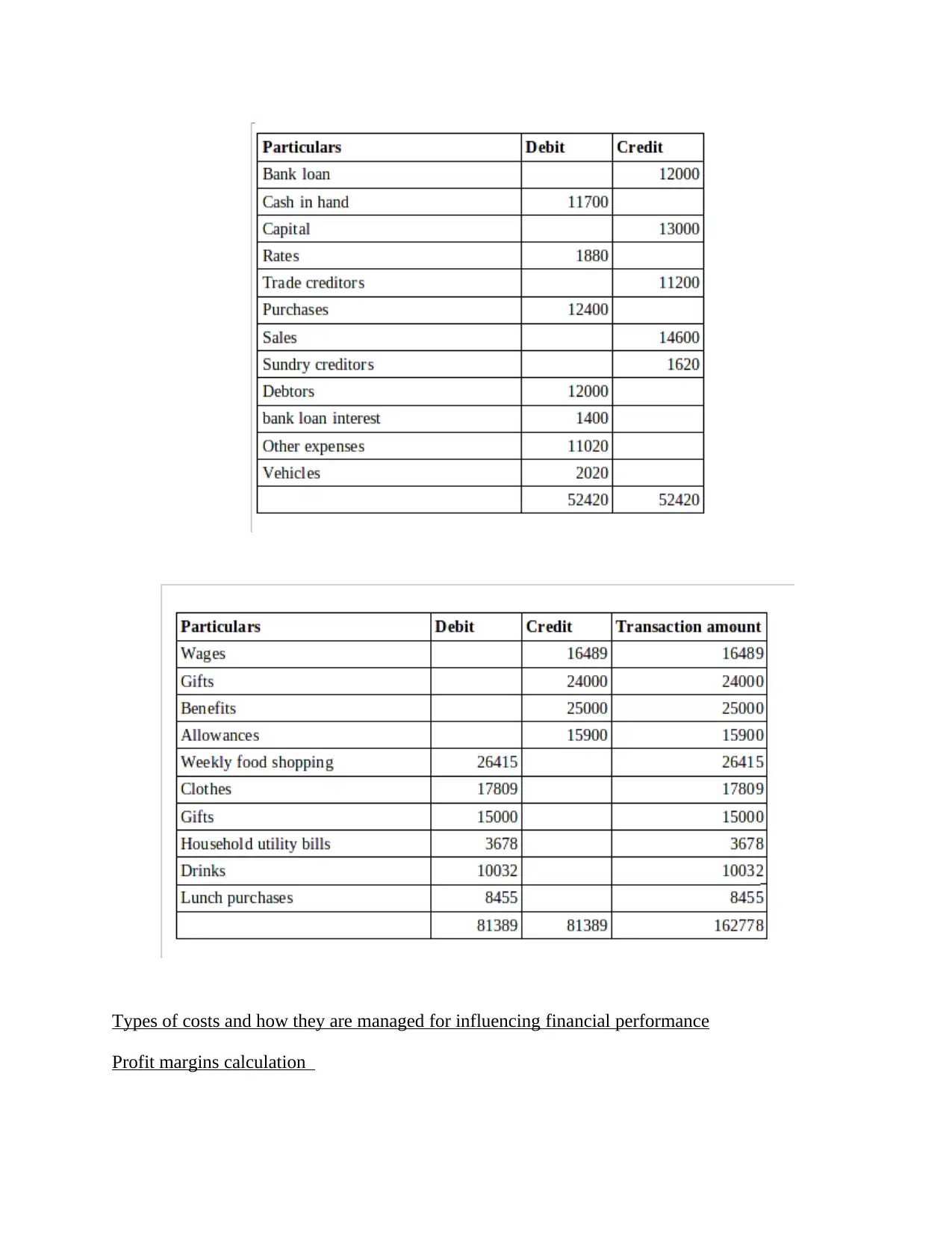
Types of costs and how they are managed for influencing financial performance
Profit margins calculation
Profit margins calculation
Paraphrase This Document
Need a fresh take? Get an instant paraphrase of this document with our AI Paraphraser
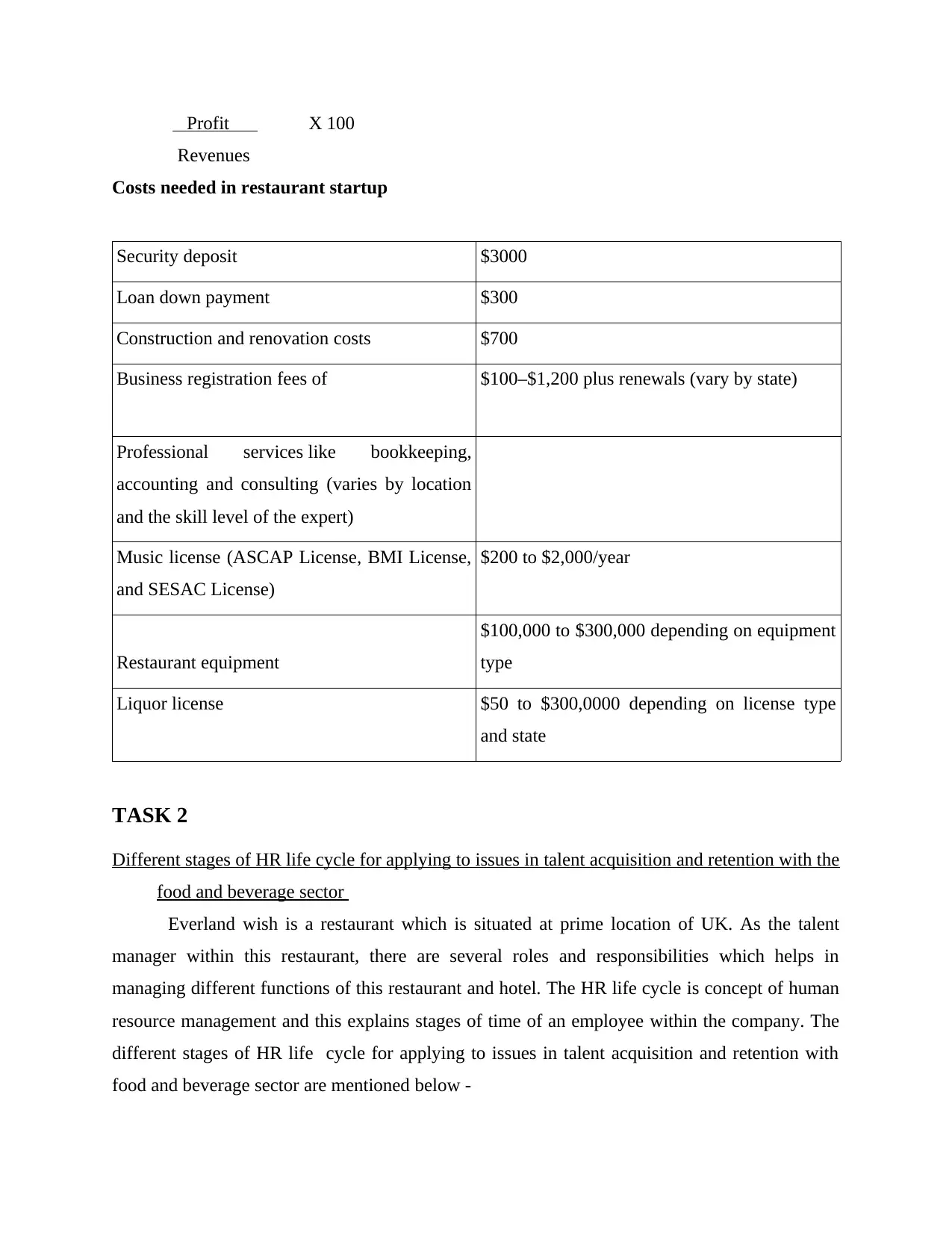
Profit X 100
Revenues
Costs needed in restaurant startup
Security deposit $3000
Loan down payment $300
Construction and renovation costs $700
Business registration fees of $100–$1,200 plus renewals (vary by state)
Professional services like bookkeeping,
accounting and consulting (varies by location
and the skill level of the expert)
Music license (ASCAP License, BMI License,
and SESAC License)
$200 to $2,000/year
Restaurant equipment
$100,000 to $300,000 depending on equipment
type
Liquor license $50 to $300,0000 depending on license type
and state
TASK 2
Different stages of HR life cycle for applying to issues in talent acquisition and retention with the
food and beverage sector
Everland wish is a restaurant which is situated at prime location of UK. As the talent
manager within this restaurant, there are several roles and responsibilities which helps in
managing different functions of this restaurant and hotel. The HR life cycle is concept of human
resource management and this explains stages of time of an employee within the company. The
different stages of HR life cycle for applying to issues in talent acquisition and retention with
food and beverage sector are mentioned below -
Revenues
Costs needed in restaurant startup
Security deposit $3000
Loan down payment $300
Construction and renovation costs $700
Business registration fees of $100–$1,200 plus renewals (vary by state)
Professional services like bookkeeping,
accounting and consulting (varies by location
and the skill level of the expert)
Music license (ASCAP License, BMI License,
and SESAC License)
$200 to $2,000/year
Restaurant equipment
$100,000 to $300,000 depending on equipment
type
Liquor license $50 to $300,0000 depending on license type
and state
TASK 2
Different stages of HR life cycle for applying to issues in talent acquisition and retention with the
food and beverage sector
Everland wish is a restaurant which is situated at prime location of UK. As the talent
manager within this restaurant, there are several roles and responsibilities which helps in
managing different functions of this restaurant and hotel. The HR life cycle is concept of human
resource management and this explains stages of time of an employee within the company. The
different stages of HR life cycle for applying to issues in talent acquisition and retention with
food and beverage sector are mentioned below -
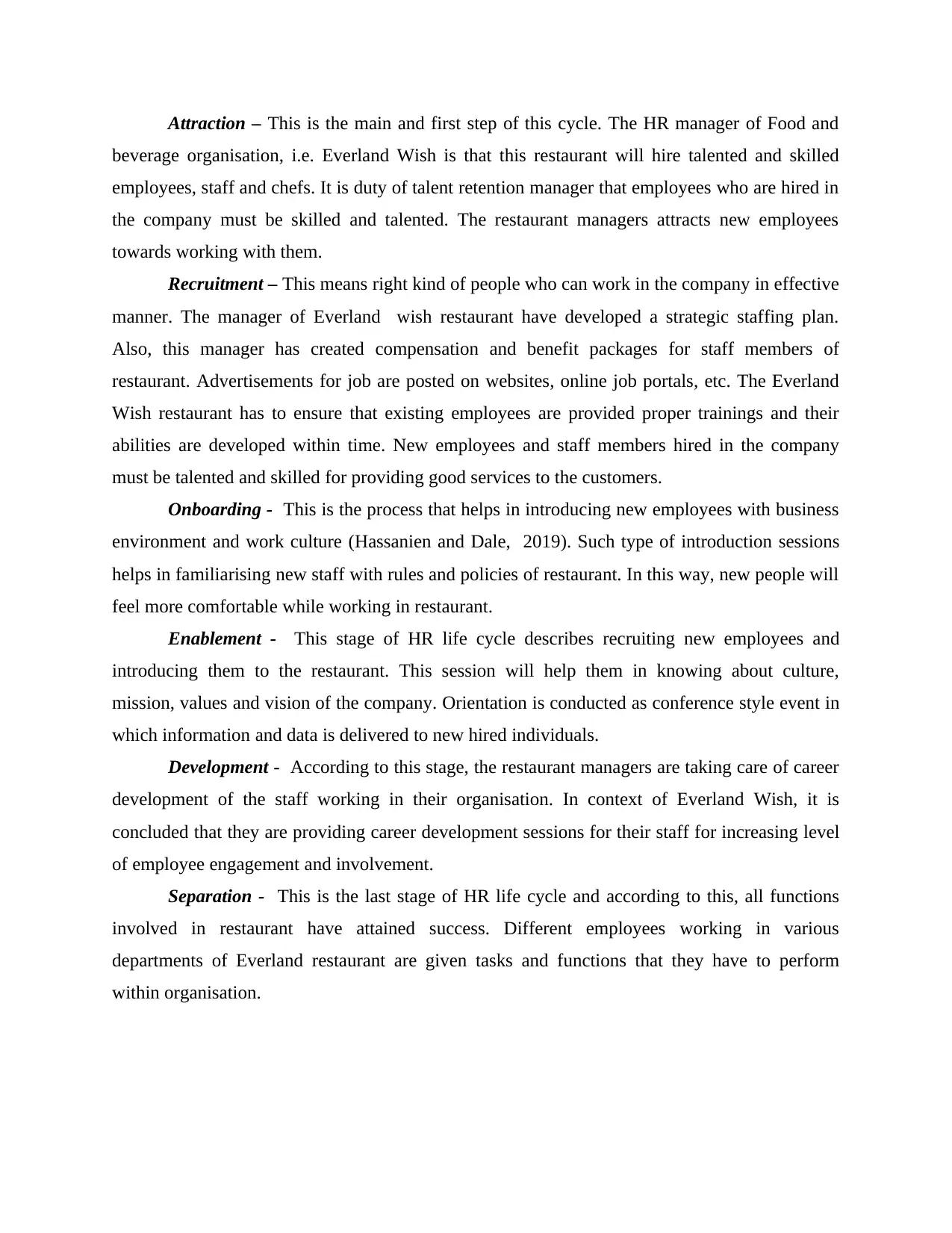
Attraction – This is the main and first step of this cycle. The HR manager of Food and
beverage organisation, i.e. Everland Wish is that this restaurant will hire talented and skilled
employees, staff and chefs. It is duty of talent retention manager that employees who are hired in
the company must be skilled and talented. The restaurant managers attracts new employees
towards working with them.
Recruitment – This means right kind of people who can work in the company in effective
manner. The manager of Everland wish restaurant have developed a strategic staffing plan.
Also, this manager has created compensation and benefit packages for staff members of
restaurant. Advertisements for job are posted on websites, online job portals, etc. The Everland
Wish restaurant has to ensure that existing employees are provided proper trainings and their
abilities are developed within time. New employees and staff members hired in the company
must be talented and skilled for providing good services to the customers.
Onboarding - This is the process that helps in introducing new employees with business
environment and work culture (Hassanien and Dale, 2019). Such type of introduction sessions
helps in familiarising new staff with rules and policies of restaurant. In this way, new people will
feel more comfortable while working in restaurant.
Enablement - This stage of HR life cycle describes recruiting new employees and
introducing them to the restaurant. This session will help them in knowing about culture,
mission, values and vision of the company. Orientation is conducted as conference style event in
which information and data is delivered to new hired individuals.
Development - According to this stage, the restaurant managers are taking care of career
development of the staff working in their organisation. In context of Everland Wish, it is
concluded that they are providing career development sessions for their staff for increasing level
of employee engagement and involvement.
Separation - This is the last stage of HR life cycle and according to this, all functions
involved in restaurant have attained success. Different employees working in various
departments of Everland restaurant are given tasks and functions that they have to perform
within organisation.
beverage organisation, i.e. Everland Wish is that this restaurant will hire talented and skilled
employees, staff and chefs. It is duty of talent retention manager that employees who are hired in
the company must be skilled and talented. The restaurant managers attracts new employees
towards working with them.
Recruitment – This means right kind of people who can work in the company in effective
manner. The manager of Everland wish restaurant have developed a strategic staffing plan.
Also, this manager has created compensation and benefit packages for staff members of
restaurant. Advertisements for job are posted on websites, online job portals, etc. The Everland
Wish restaurant has to ensure that existing employees are provided proper trainings and their
abilities are developed within time. New employees and staff members hired in the company
must be talented and skilled for providing good services to the customers.
Onboarding - This is the process that helps in introducing new employees with business
environment and work culture (Hassanien and Dale, 2019). Such type of introduction sessions
helps in familiarising new staff with rules and policies of restaurant. In this way, new people will
feel more comfortable while working in restaurant.
Enablement - This stage of HR life cycle describes recruiting new employees and
introducing them to the restaurant. This session will help them in knowing about culture,
mission, values and vision of the company. Orientation is conducted as conference style event in
which information and data is delivered to new hired individuals.
Development - According to this stage, the restaurant managers are taking care of career
development of the staff working in their organisation. In context of Everland Wish, it is
concluded that they are providing career development sessions for their staff for increasing level
of employee engagement and involvement.
Separation - This is the last stage of HR life cycle and according to this, all functions
involved in restaurant have attained success. Different employees working in various
departments of Everland restaurant are given tasks and functions that they have to perform
within organisation.
⊘ This is a preview!⊘
Do you want full access?
Subscribe today to unlock all pages.

Trusted by 1+ million students worldwide
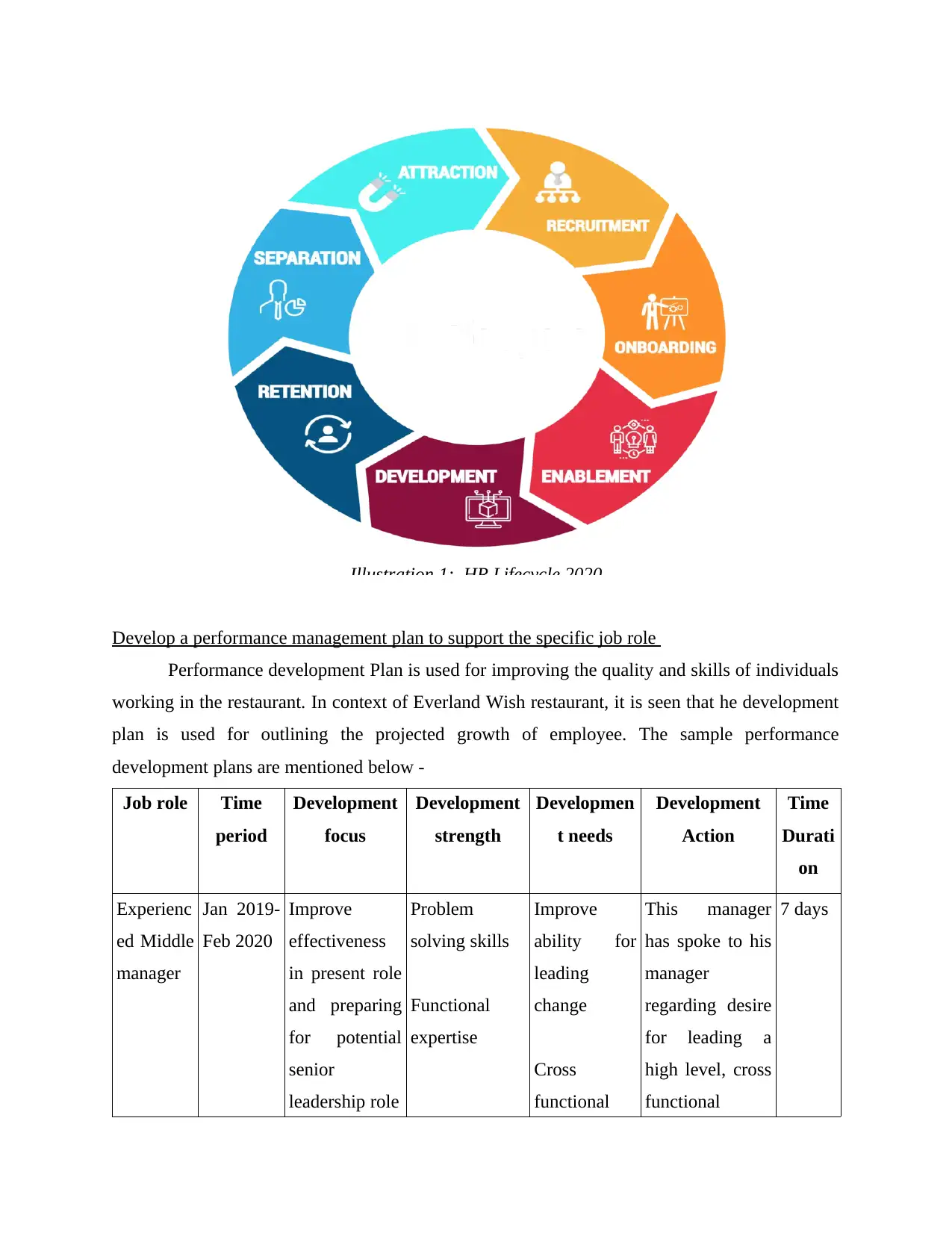
Develop a performance management plan to support the specific job role
Performance development Plan is used for improving the quality and skills of individuals
working in the restaurant. In context of Everland Wish restaurant, it is seen that he development
plan is used for outlining the projected growth of employee. The sample performance
development plans are mentioned below -
Job role Time
period
Development
focus
Development
strength
Developmen
t needs
Development
Action
Time
Durati
on
Experienc
ed Middle
manager
Jan 2019-
Feb 2020
Improve
effectiveness
in present role
and preparing
for potential
senior
leadership role
Problem
solving skills
Functional
expertise
Improve
ability for
leading
change
Cross
functional
This manager
has spoke to his
manager
regarding desire
for leading a
high level, cross
functional
7 days
Illustration 1: HR Lifecycle.2020
Performance development Plan is used for improving the quality and skills of individuals
working in the restaurant. In context of Everland Wish restaurant, it is seen that he development
plan is used for outlining the projected growth of employee. The sample performance
development plans are mentioned below -
Job role Time
period
Development
focus
Development
strength
Developmen
t needs
Development
Action
Time
Durati
on
Experienc
ed Middle
manager
Jan 2019-
Feb 2020
Improve
effectiveness
in present role
and preparing
for potential
senior
leadership role
Problem
solving skills
Functional
expertise
Improve
ability for
leading
change
Cross
functional
This manager
has spoke to his
manager
regarding desire
for leading a
high level, cross
functional
7 days
Illustration 1: HR Lifecycle.2020
Paraphrase This Document
Need a fresh take? Get an instant paraphrase of this document with our AI Paraphraser
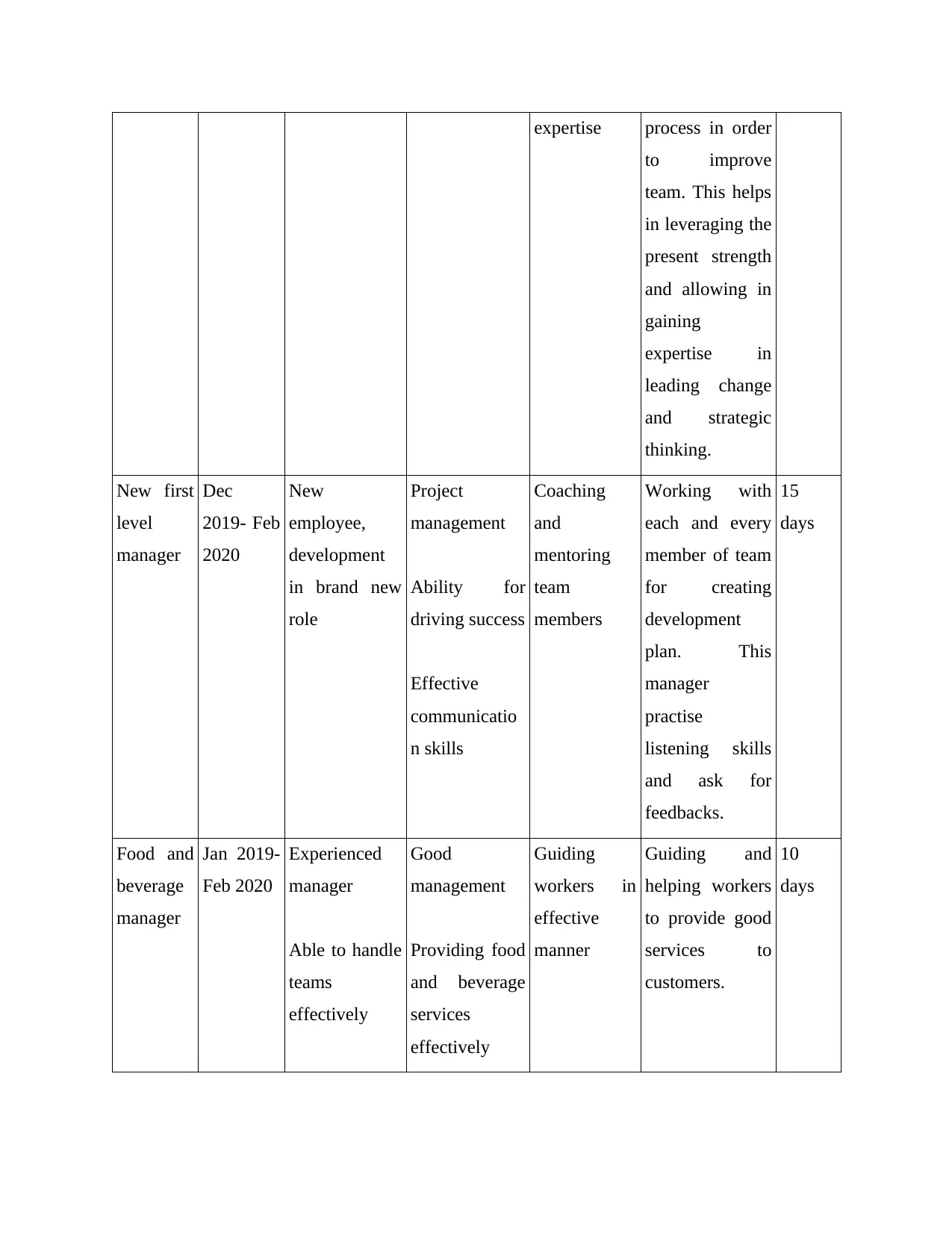
expertise process in order
to improve
team. This helps
in leveraging the
present strength
and allowing in
gaining
expertise in
leading change
and strategic
thinking.
New first
level
manager
Dec
2019- Feb
2020
New
employee,
development
in brand new
role
Project
management
Ability for
driving success
Effective
communicatio
n skills
Coaching
and
mentoring
team
members
Working with
each and every
member of team
for creating
development
plan. This
manager
practise
listening skills
and ask for
feedbacks.
15
days
Food and
beverage
manager
Jan 2019-
Feb 2020
Experienced
manager
Able to handle
teams
effectively
Good
management
Providing food
and beverage
services
effectively
Guiding
workers in
effective
manner
Guiding and
helping workers
to provide good
services to
customers.
10
days
to improve
team. This helps
in leveraging the
present strength
and allowing in
gaining
expertise in
leading change
and strategic
thinking.
New first
level
manager
Dec
2019- Feb
2020
New
employee,
development
in brand new
role
Project
management
Ability for
driving success
Effective
communicatio
n skills
Coaching
and
mentoring
team
members
Working with
each and every
member of team
for creating
development
plan. This
manager
practise
listening skills
and ask for
feedbacks.
15
days
Food and
beverage
manager
Jan 2019-
Feb 2020
Experienced
manager
Able to handle
teams
effectively
Good
management
Providing food
and beverage
services
effectively
Guiding
workers in
effective
manner
Guiding and
helping workers
to provide good
services to
customers.
10
days
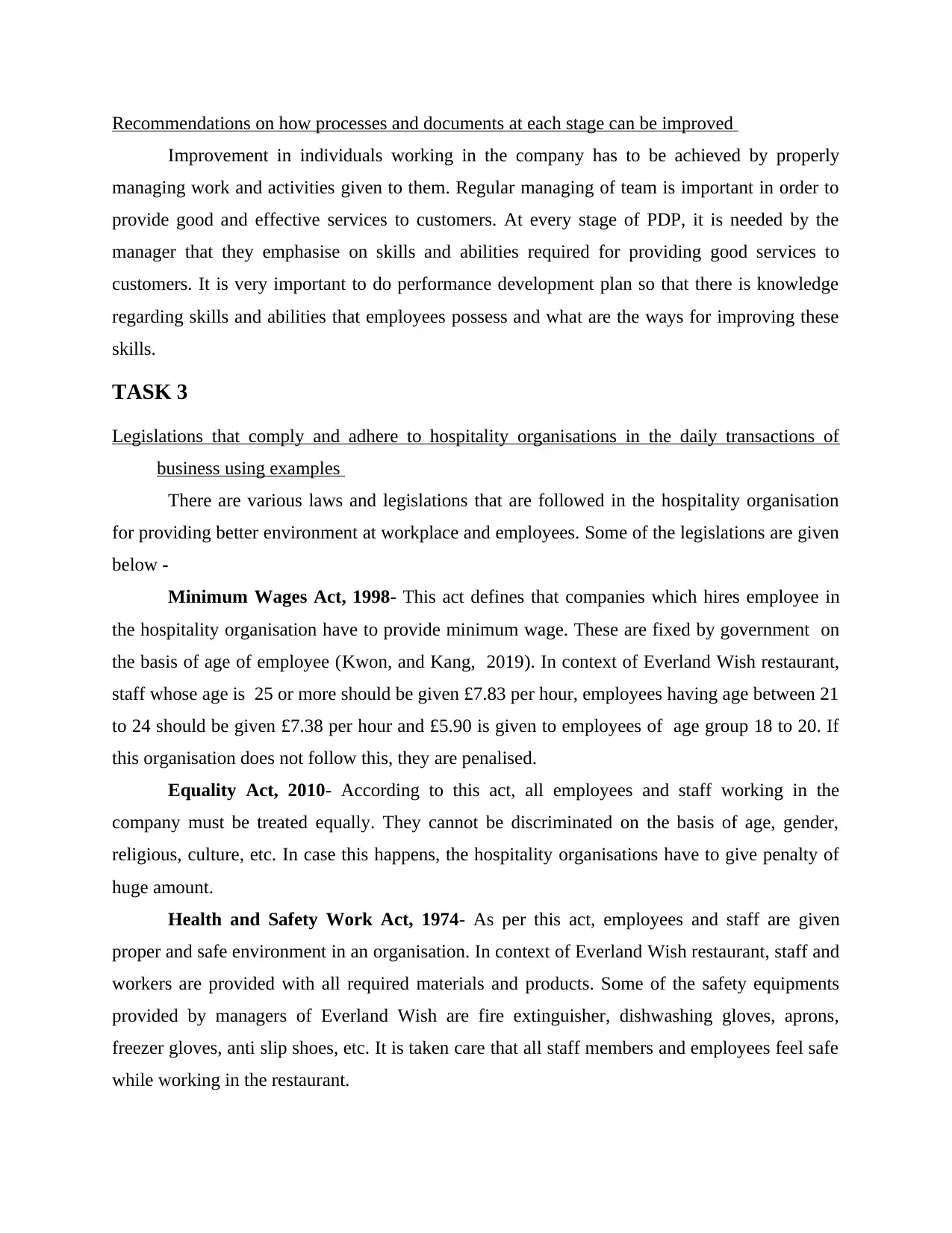
Recommendations on how processes and documents at each stage can be improved
Improvement in individuals working in the company has to be achieved by properly
managing work and activities given to them. Regular managing of team is important in order to
provide good and effective services to customers. At every stage of PDP, it is needed by the
manager that they emphasise on skills and abilities required for providing good services to
customers. It is very important to do performance development plan so that there is knowledge
regarding skills and abilities that employees possess and what are the ways for improving these
skills.
TASK 3
Legislations that comply and adhere to hospitality organisations in the daily transactions of
business using examples
There are various laws and legislations that are followed in the hospitality organisation
for providing better environment at workplace and employees. Some of the legislations are given
below -
Minimum Wages Act, 1998- This act defines that companies which hires employee in
the hospitality organisation have to provide minimum wage. These are fixed by government on
the basis of age of employee (Kwon, and Kang, 2019). In context of Everland Wish restaurant,
staff whose age is 25 or more should be given £7.83 per hour, employees having age between 21
to 24 should be given £7.38 per hour and £5.90 is given to employees of age group 18 to 20. If
this organisation does not follow this, they are penalised.
Equality Act, 2010- According to this act, all employees and staff working in the
company must be treated equally. They cannot be discriminated on the basis of age, gender,
religious, culture, etc. In case this happens, the hospitality organisations have to give penalty of
huge amount.
Health and Safety Work Act, 1974- As per this act, employees and staff are given
proper and safe environment in an organisation. In context of Everland Wish restaurant, staff and
workers are provided with all required materials and products. Some of the safety equipments
provided by managers of Everland Wish are fire extinguisher, dishwashing gloves, aprons,
freezer gloves, anti slip shoes, etc. It is taken care that all staff members and employees feel safe
while working in the restaurant.
Improvement in individuals working in the company has to be achieved by properly
managing work and activities given to them. Regular managing of team is important in order to
provide good and effective services to customers. At every stage of PDP, it is needed by the
manager that they emphasise on skills and abilities required for providing good services to
customers. It is very important to do performance development plan so that there is knowledge
regarding skills and abilities that employees possess and what are the ways for improving these
skills.
TASK 3
Legislations that comply and adhere to hospitality organisations in the daily transactions of
business using examples
There are various laws and legislations that are followed in the hospitality organisation
for providing better environment at workplace and employees. Some of the legislations are given
below -
Minimum Wages Act, 1998- This act defines that companies which hires employee in
the hospitality organisation have to provide minimum wage. These are fixed by government on
the basis of age of employee (Kwon, and Kang, 2019). In context of Everland Wish restaurant,
staff whose age is 25 or more should be given £7.83 per hour, employees having age between 21
to 24 should be given £7.38 per hour and £5.90 is given to employees of age group 18 to 20. If
this organisation does not follow this, they are penalised.
Equality Act, 2010- According to this act, all employees and staff working in the
company must be treated equally. They cannot be discriminated on the basis of age, gender,
religious, culture, etc. In case this happens, the hospitality organisations have to give penalty of
huge amount.
Health and Safety Work Act, 1974- As per this act, employees and staff are given
proper and safe environment in an organisation. In context of Everland Wish restaurant, staff and
workers are provided with all required materials and products. Some of the safety equipments
provided by managers of Everland Wish are fire extinguisher, dishwashing gloves, aprons,
freezer gloves, anti slip shoes, etc. It is taken care that all staff members and employees feel safe
while working in the restaurant.
⊘ This is a preview!⊘
Do you want full access?
Subscribe today to unlock all pages.

Trusted by 1+ million students worldwide
1 out of 16
Related Documents
Your All-in-One AI-Powered Toolkit for Academic Success.
+13062052269
info@desklib.com
Available 24*7 on WhatsApp / Email
![[object Object]](/_next/static/media/star-bottom.7253800d.svg)
Unlock your academic potential
Copyright © 2020–2026 A2Z Services. All Rights Reserved. Developed and managed by ZUCOL.





